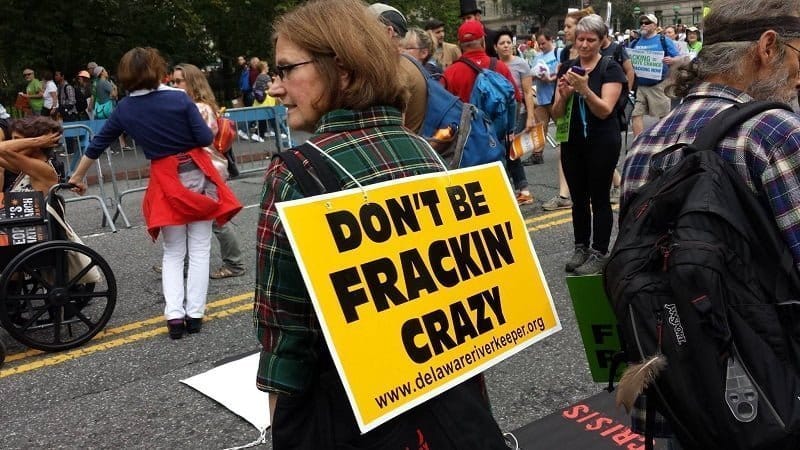In these unprecedented political times, many Americans are rightfully concerned about federal rollbacks of basic rights and protections. Unfortunately, the environment is front and center on the chopping block – the current administration has made it clear that environmental protections are not a priority, and very basic federal environmental protections are being stripped away in the name of “U.S. energy dominance.” A recent meeting between a few Northeast Pennsylvania legislators and the new EPA Administrator has some wondering if the Delaware River Watershed frack ban is the federal government’s next target.
What is fracking?
Hydraulic fracturing, better known as “fracking,” is a process used to extract fossil fuels like oil and natural gas from underground rock formations. A mixture of sand, water, and chemicals are blasted into the rocks at high pressures to form cracks that release the embedded fossil fuels. The Marcellus Shale is a large underground rock formation in the Appalachian region that contains large reserves of natural gas. As such, fossil fuel developers set up a multitude of fracking operations throughout Pennsylvania, West Virginia, and Ohio, in order to capture and sell the gas.
Fracking poses many threats to nearby communities and environments. Not only does fracking require large volumes of water, most of which is not recovered, but it causes nearby water sources to become contaminated with radioactive materials and heavy metals released from the underground rock formations, as well as chemical remnants of the toxic frack fluids used for blasting. It also produces enormous volumes of toxic wastewater that must be disposed of. More and more research is coming out that links proximity to fracking operations to increased health issues, including chronic respiratory problems, heart disease, low birth weights, chronic nose bleeds, and premature death. Increased cancer rates in children is also under study. Moreover, the natural gas that leaks into the atmosphere is largely composed of methane, a greenhouse gas that traps heat 80 times more effectively than carbon dioxide over a 20-year timescale. The plethora of environmental, public health, and climate changing effects of fracking also have detrimental economic impacts.
What is the Delaware River Watershed frack ban?
Knowing that fracking operations would reach our watershed, the Delaware Riverkeeper Network led the charge alongside partner organizations to call on the Delaware River Basin Commission (DRBC) – the interstate agency responsible for protecting and managing the water resources of the Delaware River Basin – to enact a temporary moratorium on fracking in the Delaware River Watershed. In 2010 we succeeded. It was the DRBC’s initial intention to use the moratorium period to develop draft gas drilling regulations, which would then be presented to the public for comment before any final rules were put into effect. However, when the draft regulations were proposed, individuals and organizations throughout the Watershed submitted over 69,000 comments to the DRBC – most of them calling for the proposed regulations to be thrown out for being too weak and insisting on a comprehensive environmental analysis detailing the effects gas development would have on the 17 million people who rely on the Delaware River for their drinking water and nearly 13,000 square miles of ecosystem in the Watershed. From that point on, a lengthy debate on the future of fracking in the Watershed ensued, full of DRBC meetings, damning research, and powerful grassroots actions. It wasn’t until February 2021 that the DRBC officially enacted a permanent frack ban, stating that based on large volumes of scientific evidence, fracking “poses immediate and long term risks to water resources, human health and aquatic life in the Delaware River Basin.” The DRBC representatives from all four involved states – Pennsylvania, New Jersey, New York, and Delaware – voted in favor of the ban, while the one federal representative from the U.S. Army Corps of Engineers abstained. That frack ban is in effect today throughout the entire Delaware River Watershed..
What is happening now?
The ban has been celebrated as a historic environmental victory for the Delaware River Watershed. But with the Trump administration’s unrelenting push to “unleash American energy,” there have been threats made to take down the frack ban. On March 2, 2025, Northeast Pennsylvania lawmakers convened with pro-fracking businesses and unions and the new EPA administrator, where discontent with the Delaware Watershed frack ban was a popular topic of discussion. At the meeting the EPA Administrator reconfirmed the federal administration’s focus on “U.S. energy dominance,” and implied that he would be supportive of advancing fracking interests in the Northeast PA region that actions taken against the frack ban would be in line with this agenda.
So is the current frack ban at risk? The answer is not as simple as a handful of Pennsylvania lawmakers, nor the federal administration, wanting the ban to go. In fact, cases brought by state legislators, industry interests, and PA landowners attempting to undermine the ban have failed and were dismissed by the Courts. And since the DRBC is a regional agency with an independent authority to manage the Delaware River Basin, the Trump administration does NOT have the legal authority to simply overturn the ban, despite attempts to make it appear this way.
At this time, the preservation of the frack ban is in the hands of the DRBC. The Delaware Riverkeeper Network is prepared to support the DRBC to stand by their scientifically-backed decision on this matter. There’s no question that the Watershed community that fought so long and hard to ban fracking here won’t fight to the end to keep this protection in place. Amidst the political turmoil at the federal level, we are reminded that now more than ever, states and independent regional authorities are key to not just upholding and enforcing good environmental policies, but must also continue to pave the way to a safer, more sustainable future for all.
When it comes to protecting our River and communities, we say Hands Off Our Ban!







